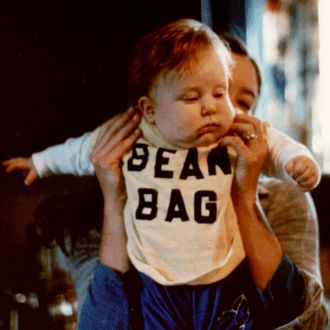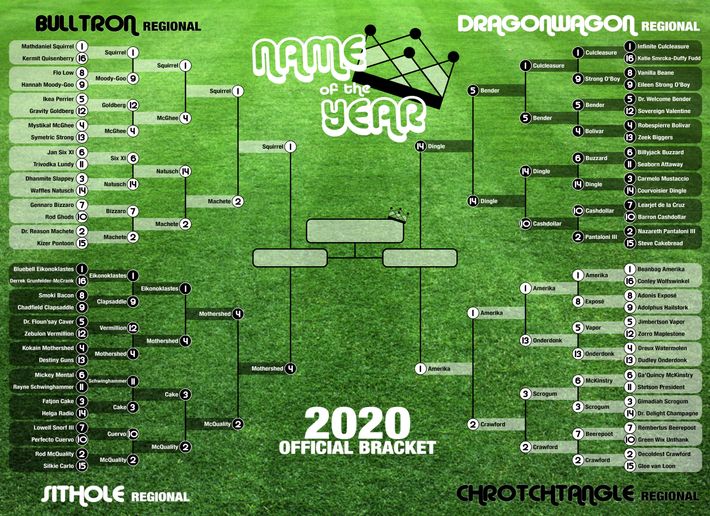
Name of the Year is a bona fide internet tradition, so when co-founder Stefan Fatsis asked Vulture to host the final rounds of the 2020 tournament, we just had to say yes. Today, he breaks down the semifinal matchups. (If this is all gibberish to you, read about the NOTY field here.)
When the 2020 Name of the Year tournament bracket dropped last week, friends began texting New York childrenÔÇÖs librarian Beanbag Amerika with news that he was a No. 1 seed. ÔÇ£This is a hell of a thing to wake up to,ÔÇØ Amerika tweeted.
Encountering amazing names was a hell of a thing when Name of the Year started in a college dorm in 1983. My buddies and I never imagined sharing with the world our love for the majesty, beauty, wit, grandeur, creativity, and sheer preposterousness of human names. The Apple Macintosh didnÔÇÖt even exist, let alone Google. We stumbled across names in the newspaper, wrote them down on scraps of paper, and taped them to a wall. Someone suggested picking a winner, so we drank some beer and did.
We reveled in the sweet cadence of Anicet Lavodrama, the sophomoric giggle of Dick Trickle, the literary sophistication of Baskerville Holmes, the absurdist contrast of Delano Turnipseed (ÔÇ£ItÔÇÖs like you put a fake name in the program or something,ÔÇØ the high-school football playerÔÇÖs coach said). We still revel. This yearÔÇÖs 64 finalists ÔÇö culled from a field of more than 600 name-inees ÔÇö included Dutch art historian Jan Six XI, Cura├ºaoan soccer player Jimbertson Vapor, New Jersey high-school drama instructor Perfecto Cuervo, and Ohio college football coach Mickey Mental.
But those fine names were eliminated in early rounds of voting and weÔÇÖre down to the Final Four. In one semifinal, itÔÇÖs Kansas carjacker Mathdaniel Squirrel versus early-aughts Northeastern Oklahoma A&M quarterback Kokain Mothershed; they vanquished British maths professor Dr. Reason Machete and Illinois educator Rod McQuality in the quarterfinals. In the other matchup, itÔÇÖs former Marist cornerback Courvoisier Dingle against the aforementioned Beanbag Amerika. Their prior victims: Harvard biochemist Dr. Welcome Bender and LSU football commit Decoldest Crawford. Honestly, any of these eight would be a worthy champion. You can vote here.
We asked Beanbag Amerika ÔÇö a 44-year-old Queens resident, Brooklyn Public Library childrenÔÇÖs librarian, and crossword-puzzle enthusiast ÔÇö about his name and his fight for the Name of the Year crown.
Every name holds a story. WhatÔÇÖs the story of Beanbag Amerika?
The short version that I tell people when they invariably ask, ÔÇ£Where did your name come from?ÔÇØ is that my parents were hippies. The longer version is this: A few years before I was born, they were living in India and my dad met a guy who was selling a collection of traditional musical instruments and put a bid on them. To remember who he was, this guy wrote down ÔÇ£Orangepants Amerika,ÔÇØ as my father was an American who mostly always wore bright-orange pants. I donÔÇÖt think he had the winning bid, but the name stuck for a while. ThatÔÇÖs where the last name came from. The first name was, I suspect ÔÇö IÔÇÖve never pushed my parents on this ÔÇö because I was a very chubby baby. But what they put down on the birth certificate, I imagine due to grandparental pressure, was a more common family name.
What was that name and why did you give it up?
I tend not to tell people. ItÔÇÖs not a secret, exactly. IÔÇÖve had friends who pushed and figured it out, and friends whoÔÇÖve said they donÔÇÖt want to know. My dadÔÇÖs family is Jewish, and as is traditional, I was named after dead relatives. It was the commonality of it that made me give it up. Freshman year of high school, I was in a math class in which three other people had the same name. I largely stopped responding to it unless I recognized the voice, because most of the time I wasnÔÇÖt the one being addressed.
And Beanbag Amerika is your legal name now.
Right. My parents had mostly stopped using Beanbag by the time I was 5 or so. As I distanced myself from my name in high school, I started thinking about changing it. Most of the contenders were inspired by Greek mythology, high fantasy novels, D&D. My first year in college, I spent a lot of time online using the precursors to what would become social media: IRC, usenet, MUSHes. These gave me the opportunity to try out new names. I fell into variations of Bean-Bag, Beanbag, Bean, Rev.Bean. When I was 20, I decided to have it legally changed. I had been mostly going by ÔÇ£BeanÔÇØ online for a few years, but went with the full Beanbag Amerika out of some sense of ancestral fealty, which doesnÔÇÖt really make a lot of sense, as it has no connection beyond my parents.
What has being Beanbag Amerika taught you about social conventions surrounding names? Conversely, what do you think your name has taught other people?
When I made the legal change and had to update everything ÔÇö driverÔÇÖs license, bank accounts, etc. ÔÇö I found that most responses ranged from slightly bemused to entirely unfazed. A lot of people assume that itÔÇÖs a business, rather than personal, name.┬áIt is definitely a more ostentatious name than I am as a person, which has been good and bad. I am quite shy and socially anxious. The name often precedes me, which can help diffuse my shyness, but also put me on the spot.
Dealing with customer service can sometimes be difficult, but ideally I think customer-service training involves some degree of name-sensitivity. My name is weird, but a lot of the time when our immediate reaction to a name is to find it weird, thatÔÇÖs because of cultural unfamiliarity. We all, especially those who deal with the public, should be cognizant of that.
I do suspect that my name has acted as a detriment when applying for jobs. There have been studies showing that when a name on a r├®sum├® sounds as if it belongs to a white man, the applicant is more likely to get a response. Which is fucked up. When I was applying to library jobs, I did consider putting a more conventional name on my applications, though I didnÔÇÖt want to use my old given name, having left that behind me decades ago, and eventually found my current job through an in-person open house.
Does explaining your name get tiresome?
IÔÇÖve made peace with the fact that IÔÇÖm always going to be asked. The ÔÇ£hippie parentsÔÇØ line is enough for most people. In my day-to-day life I mostly go by ÔÇ£BeanÔÇØ which is unusual, but not outlandish. If I were doing it over again, I might do it a little differently? We donÔÇÖt always make the best long-term decisions at 20 years old.
Beanbag Amerika is a fantastic name for a childrenÔÇÖs librarian ÔÇö or a superhero in a childrenÔÇÖs book. How do kids respond to it?
I work, in the normal times, at the Bushwick Branch of Brooklyn Public Library and have a lot of interaction with kids. They call me Mr. Bean. For the most part, they donÔÇÖt have the cultural reference of the Rowan Atkinson character, although their adults often do.
How did you find out you had made the Name of the Year field?
Crossword Twitter alerted me. There were a half dozen or so notifications on my phone from people who I know primarily virtually ÔÇö┬áthrough Twitter, or LearnedLeague, or the crossword podcast Fill Me In. It took me about half an hour of dumbfoundment before I figured out what was happening.
You have embraced your Name of the Year moment. Do you want to win the tournament?
I would very much love to win. I was not entirely surprised that my name had found its way into the tourney, but I was shocked to be a No. 1 seed. It was thrilling to win the first few rounds so decisively, and has been somewhat nerve-racking as things have tightened up. ItÔÇÖs been a bit of a microcosm of how I feel about my name overall. On one hand, I love the attention. On the other, it creates a lot of anxiety.
YouÔÇÖre up against another fantastic name, Courvoisier Dingle, in the Final Four. Why should people vote for you?
Courvoisier Dingle is the Cinderella story of this tournament. I donÔÇÖt want to cast any aspersions on Courvoisier or his parents, but would say: Go for bespoke absurdity over a luxury brand. If I do make it past Courvoisier and into the final ÔÇö and I probably shouldnÔÇÖt admit this ÔÇö Mathdaniel Squirrel is my favorite name in the whole field.
Stefan Fatsis is the author of Word Freak and A Few Seconds of Panic, and a co-host of SlateÔÇÖs sports podcast Hang Up and Listen.


